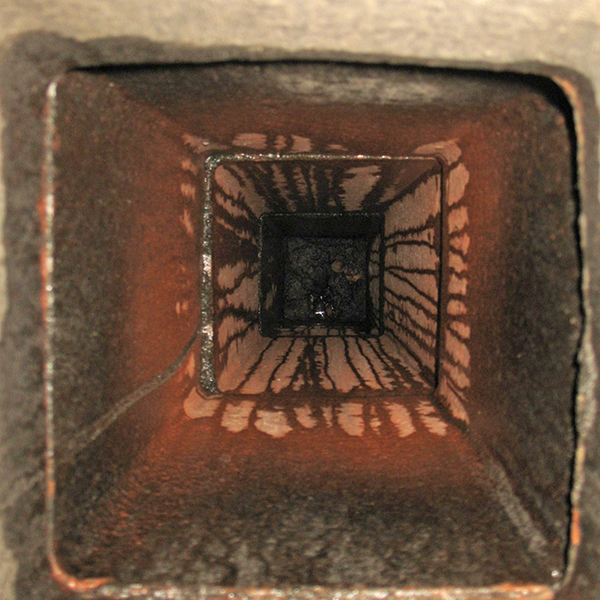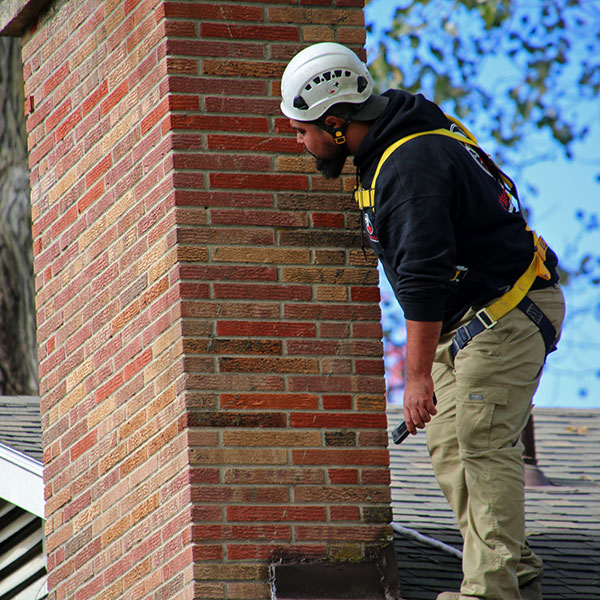Summer storms that dump huge amounts of rain in short periods of time can be problematic for a home causing damage to your chimney system. In fact, if the system isn’t properly maintained, any rain any time can lead to serious issues.
Here are some things you need to know about chimneys and rain.
 Water + chimneys = bad recipe
Water + chimneys = bad recipe
As long as the bricks and mortar and certain components that make up your chimney system are in excellent shape, rain from summer storms shouldn’t be anything to worry about. Unfortunately, most chimneys and their components are not in perfect shape.
Water that infiltrates a chimney system will cause deterioration, leading to potentially expensive repairs to both the chimney and adjacent areas within the home.
Rain can get into chimney systems in several ways. Here are some of the most common.
Cracks in the chimney crown: The concrete chimney crown at the top of the chimney can become cracked and allow water to seep through it and affect the bricks below.
A missing or damaged chimney cap: Chimney caps seal off the flue opening. With a damaged cap or no cap at all, water has a free ride into the chimney system.
Cracked or loose bricks: Water can get into these cracks and then freeze, which expands it and causes further damage. Eventually, the masonry can be compromised to the point the chimney leans or falls apart.
Decayed mortar joints: Water also can move into minor cracks in your chimney’s mortar and begin a cycle of decay and destruction, making your chimney weak, vulnerable and dangerous.
Warped, rusted or missing chimney flashing: The flashing that seals the gap between the roof and the exterior chimney must be solid, flat and secure. Water that gets past the flashing can damage interior chimney masonry and building materials of the home.
Signs of chimney water damage
Watch for these signs of water damage in your chimney:
- Discolored or damp patches on walls and the ceiling near the chimney/fireplace
- Water in the firebox
- Strong musty odors coming from the fireplace, attic or crawl spaces
- White staining on exterior chimney masonry
- Crumbling masonry on the roof near the chimney
- Leaning chimney
If the area where you live is prone to lightning during summer storms, visually inspect your chimney when the weather clears up to look for signs of lightning damage to the masonry and all exposed chimney components.
If you find damage or suspect that damage may exist, contact a local chimney repair company and have the situation resolved. Getting chimneys into tip top shape always starts with a proper chimney inspection.
 Annual chimney inspections
Annual chimney inspections
It’s advisable to schedule annual chimney inspections – even if you live in a relatively dry region. Only through a proper inspection can you know the exact condition of your chimney and its components and get on top of any repair work that’s needed.
Licensed chimney inspectors have the training and equipment to thoroughly inspect your chimney’s masonry, flue liner, venting capacity, crown, cap, flashing and more. Regular inspections can save you a lot of money and keep your chimney safe and efficient all year long.
Fluesbrothers Chimney & Fireplace of Kansas City, KS, will help you prevent damage to your chimney caused by sudden summer storms. If damage already exists, we’ll fix it. Speak with a chimney expert today at (913) 236-7141.



